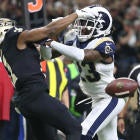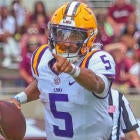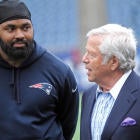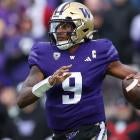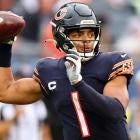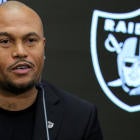The 2019 NFL season doesn't start for a few more weeks, but the preseason is now in full swing. As is the case every season, fans are surely going to be seeing a slightly different game than they did a year ago -- starting with these preseason contests. That's because the NFL has instituted several rule changes and told officials to be on the lookout for several points of emphasis during the coming season.
Some of them you surely already know. For example, the new rules regarding the review of pass interference calls were well-publicized throughout the offseason, but others may not be quite as familiar to you. To help out curious fans, we reviewed the league-issued video regarding the rule changes and points of emphasis for the 2019 season, and we put together a handy guide to what has changed and what is being further emphasized.
According to NFL Executive Vice President of Football Operations Troy Vincent, rule changes for this year cover the following areas of play, as well as some others:
- Blindside blocks.
- Leapers on point-after tries and field goals.
- Kickoffs.
- Instant replay on offensive and defensive pass interference.
"A key focus is whether a rule change can be officiated, coached, and played," Senior Vice President of Officiating Al Riveron said.
With that in mind, we highlighted the exact language used by Riveron to explain these rule changes, as well as examples of plays that would qualify or not qualify as fouls under the new rules. Without further ado ...
Blindside Blocks
"A blindside block is defined as a player initiating a block when his path is toward or parallel to his own end line, and he makes forcible contact to his opponent with his helmet, forearm, or shoulder."
Examples of said blocks from the NFL's official explanation video are below:
While blindside blocks have long been part of the game, legislating them out in an effort to make players safer is a good idea. There's no need for players to be de-cleated and potentially suffer head or neck injuries while getting hit by an opponent they can't see. There are other ways to make these blocks, as demonstrated by the video.
Team Celebrations
"Anyone other than players in uniform entering the field to celebrate will result in a 15-yard penalty for unsportsmanlike conduct."
Let's be honest: this is not a fun rule change. Let teams celebrate however they want.
Disqualifications
"In 2018, designated members of the officiating department were given the authority to disqualify a player for non-football acts if a flag was thrown related to the act. In 2019, this will be expanded to include flags for any football acts."
Like with blindside blocks, this is a change that makes sense. We may see some borderline plays turn into disqualifications early in the year, and that is sure to cause a stir, but changing the way players approach hitting in order to avoid hits to the head or neck is a common sense idea that should be implemented wherever possible.
Kickoffs
The kickoff rules were changed for a one-year trial period in 2018, and now those rules have been made permanent. There are several changes that must be adhered to.
"The kicking team is required to have five players on each side of the ball, and all kicking team players other than the kicker must be lined up with at least one foot on the yard line that is one yard behind their restraining line. Both feet must remain on the ground until the ball is kicked. Of the five players on either side of the ball, two must be between the inbounds line and the top of the numbers, and two must be between the bottom of the numbers and the sideline.
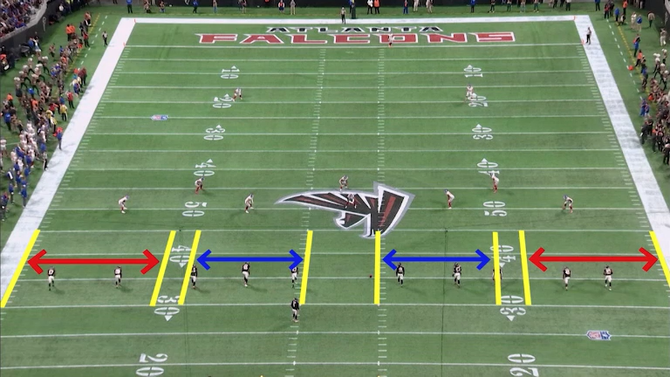
"For the receiving team, until the ball is kicked, all players must be inbounds and at least eight players must be positioned between their restraining line and a spot 15 yards behind their restraining line. This is referred to as the set-up zone. "

"Until the ball is legally touched or the ball hits the ground, no player on the receiving team may initiate a block against the receiving team in the 15-yard area between the kicking team's restraining line and five yards behind the receiving team's restraining line."
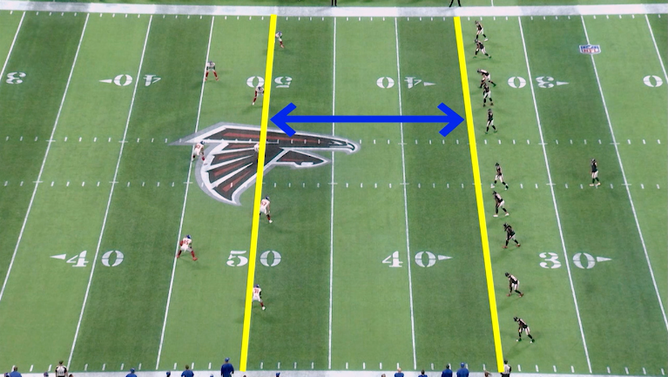
"A double-team block is permissible only by players who were initially lined up in the set-up zone at the time of the kick. Any other players may not participate in a double-team block at any time during the kick or during the return. All wedge blocks are prohibited."
The combination of these four changes is supposed to make kickoffs -- the most dangerous plays in football -- safer for players. The greatest percentage of head injuries and concussions have occurred on these plays, and outlawing the types of alignments and blocking schemes that made them more prevalent should help reduce their rates.
Penalties on Touchdowns
"Previously, fouls would only be enforced on the ensuing kickoff. Now, all fouls -- live ball, dead ball, and fouls between downs prior to the snap -- can be enforced either on the succeeding kickoff or the try."
This one is pretty self-explanatory. You can make the opposing team kick an extra point from 50 yards out if they get flagged for excessive celebration on a touchdown, or you can have them kick off from 15 yards farther away than usual. The team gets the choice.
Booth Reviews
"If a penalty flag is thrown that would negate a touchdown, the play will be reviewed to determine if there was a score before the defense elects to enforce the foul. Two-point conversion reviews will all be initiated by the replay official and are no longer challengeable by a coach. This is true no matter if the on-field ruling is good or no good."
"Both offensive and defensive pass interference, whether called on the field or not, are reviewable."
Again, this is the rule change that has gotten the most attention. The controversial no-call on Rams cornerback Nickell Robey-Coleman late in the NFC title game clearly spurred this on, and there was a lot of debate and consternation about how to implement changes for the upcoming season. We're already seeing this in action during the preseason, and there are sure to be similarly controversial reversals or upholding of calls throughout the regular season.
Points of Emphasis
The first point of emphasis is backside holding on run plays. Why this needs to be a point of emphasis, who knows. It's one of the least-impactful penalties that ever gets called, and all it will likely do is serve to make rushing the football even more inefficient than it already is.
The second point of emphasis is the helmet-lowering rule passed last year.
"It is a foul if a player lowers his head to initiate and make contact with his helmet against an opponent. The rule for the use of helmet foul prohibits lowering the head and initiating contact with the helmet to any part of an opponent. Contact does not have to be to an opponent's head or neck area. Lowering the head and initiating contact to any part of an opponent's body is a foul. This rule is all-inclusive as it pertains to all players on the entire field."
This rule was enforced pretty strictly in the preseason and early last year, but by the end of the season, it was seemingly being ignored. Perhaps making it a point of emphasis will mean more consistent enforcement during the 2019 campaign.













